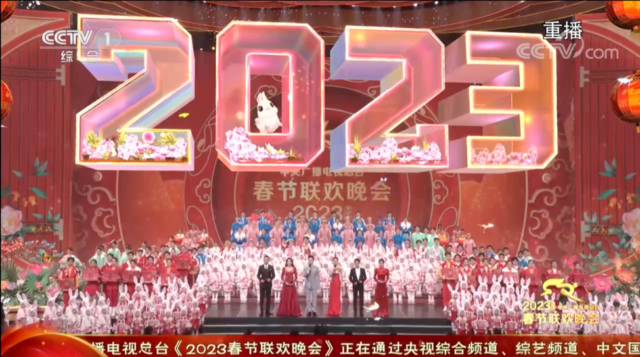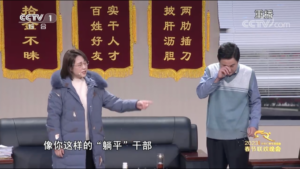
The CCTV Spring Festival Gala: A Cultural Showcase Loses its Luster
Publication: China Brief Volume: 23 Issue: 4
By:

Introduction
Every year on Lunar New Year’s Eve, people all over China gather around the television with hot dumplings to watch the China Central Television (CCTV) Chunwan (春晚)—Spring Festival Gala. Ever since the CCTV Spring Festival Gala was first broadcast in 1983, the Chunwan has profoundly altered how Chinese people celebrate the Lunar New Year. The Spring Festival Gala serves not only as a medium of cultural entertainment on this traditional Chinese holiday but as an educational and propaganda platform to convey authoritative information to an engaged national audience (Guangming Daily, February 1). However, at the 40th anniversary of CCTV’s first Chunwan, this grand showcase to ring in the Lunar New Year has gradually lost popularity among Chinese people. The program sticks too heavily to the Chinese government’s political agenda and as a result, the current iteration of Chunwan comes across as a magnificent but hollow performance. Perhaps the starkest reminder of this was that the 2023 program complete glossed over the Chinese people’s past three-year ordeal of COVID-19 and Zero-COVID lockdowns (CCTV, January 23).
Reform Era Origins
Chunwan was born at the outset of the Reform and Opening Up era. During the early 1980s, China had just started holistic economic reforms, turning its focus to prioritizing economic development beginning with the Third Plenum of the 11th Central Committee of the Chinese Communist Party (CCP) in 1978 and Deng Xiaoping’s ascent to the de facto, paramount leadership role. This turning point had a profound impact on Chinese peoples’ social and cultural lives. Moreover, with the growing popularity of television in the 1980s, people in China demanded a new form of entertainment on the screens in their homes. Therefore, in the literary and artistic fields, CCTV developed an evolved modern version of the Gala to celebrate the Lunar New Year—incorporating singing, dancing, Peking Opera, and comedy sketches—and broadcast the whole show live to a nationwide audience.
During the first two decades of the Spring Festival Gala broadcast, the performances were intended to be more entertaining than instructive, thanks to the relatively loose and liberalized atmosphere of the Reform Era 1980s. For example, the TV executives of Chunwan even proposed a suggestion to invite the TV audience to participate in a live broadcast of the Gala by calling the Gala main desk to request their favorite songs or shows during the first couple of years of Chunwan (Sohu, January 31, 2022). Even during the 1990s, when the repertoire of the Gala was mainly regularized and scrutinized by the CCTV headquarters, the director team of the Gala still left some allowance and freedom for the contents of artistic performances at Chunwan. The shows, particularly the comedy sketches, even often touched lightly on the “political redlines” of PRC authorities. As a result, in the 1980s to 1990s, many Chinese people came to appreciate Chunwan’s somewhat sharp caricatures critiquing sociopolitical phenomena, from the One Child Policy and bureaucratic corruption (Sohu, January 22; Sina, June 3, 2020). In short, performances based on real life in China resonated with people, giving them a chance to be entertained and, after laughing, perhaps even reflect on real societal problems.
Dancing with Shackles On
In recent years, the entertainment appeal of Chunwan has faded. Instead, the annual gala has come to serve a more propagandistic and instructive role in a cultural environment that has been characterized by tighter ideological control and diminished space for artistic creation since the promulgation of CCP Document No.9 a decade ago. [1] As a result, directors, screenwriters, and other artistic creators involved in producing Chunwan are increasingly focused on self-censoring any content that could be perceived as political sensitivity in the eyes of the authorities. For these reasons, this year’s Chunwan went through as many as five joint rehearsals to facilitate the deletion of any politically sensitive content and to edit out any inappropriate program content (Global Times, January 19). This ensures that there are no unexpected “accidents” during the live broadcast.
In recent years, dialogues, including the comedy sketches in Chunwan, have been reduced and the proportion of singing and dancing programs featuring popular Chinese stars has increased, as the Spring Festival Gala directors likely see this as the safest, least political, and hence least risky content. The Chunwan comedy sketches in particular are becoming more instructive and propagandistic, echoing the slogans or programs of the CCP Central Propaganda Department (CPD, 中宣部) and CCP Central Commission for Discipline Inspection (CCDI, 中纪委).
A prominent example in this year’s Chunwan is one of the comedy sketches, “The Pit” (《坑》), which portrays a so-called “lying-flat cadre” (躺平式干部), a local official, who shirks responsibility for responding to residents’ petitions and always makes excuses for himself (CCTV, January 21). While the actors in this comedy sketch are amusing, the criticism of the cadres’ “inaction” (不作为) comes off as superficial. The whole performance seems like a propositional essay for the Party apparatus on the need to rectify “bureaucracy” (官僚主义) and “formalism” (形式主义). Although the CCDI has applauded this comedy sketch in its commentary (CCDI, January 22), this hardly suggests the Party is focused on addressing the negative influence of party members’ “inaction” on the common Chinese people, e.g., local officials shirking responsibility during the Zero-COVID lockdowns. Rather, such performances serve as a megaphone to reinforce the Party’s “anti-bureaucracy” agenda and propaganda messaging.

The Party’s “Year-End Summary”
For decades, Chunwan has provided the Chinese people with an official “year-end summary” (年终总结) of the previous twelve months. The tradition is to enumerate China’s recent tragedies and triumphs by directly or indirectly referencing major events, from the 1998 floods to the 2008 Beijing Olympics, through the various gala performances and skits.
Notably, these significant events, no matter how traumatic or glorious for China, would be meticulously mentioned in the scripts from either Gala’s emcees or actors, which struck a chord among nationwide Chinese people since they had clear feelings and fresh memories of what happened in their lives. However, in a break from this tradition, during this year’s Spring Festival Gala, the whole Chunwan show rarely reflected on or even mentioned the suffering of the Chinese people during the constant Zero-COVID lockdowns in 2022. This also reflects a dramatic shift away from the Party’s own rhetoric throughout much of the past several years on the need to achieve victory in the struggle to “defeat the epidemic” (People.cn, November 28, 2022). The 2023 Chunwan reveals that the Party wants to totally turn the page on the struggles that Chinese people have experienced in the past three years since COVID-19 occurred, as if nothing has happened. The goal is to create the illusion for the Chinese people of a bright future with pleasant expectations (Xinhua, January 22).
Of course, ever since Xi stepped into office, the Chunwan also made its adjustments in consonance with the tighter ideological environment. As a result, since 2014, Chunwan has earned the reputation of the “question bank” for the politics subject test in both the college entrance examination (高考) and the national civil service examination (国家公务员考试), as most of the themes of the Chunwan performances could be associated with CCP guidelines or governmental policies in areas such as culture, agriculture, climate change, social welfare, ideological work, etc. (Zhejiang News, February 5, 2017). In this sense, all Chunwan performances carry out a critical political mission to demonstrate the wise Party leadership in launching correct policies and thereafter making achievements in various domains in the past year. To make a long story short, the performances of Chunwan aim to “tell China’s story well” (讲好中国故事) year by year—definitely through the Party’s narrative.
Conclusion
After 40 years of live broadcasts, the Spring Festival Gala has already deviated from its original intention of entertaining the public and celebrating the Lunar New Year. As the programming becomes more politicized and propagandistic, audiences are starting to tune out. This year’s CCTV Spring Festival Gala ratings dropped to an 8-year low of 20.23 percent, compared to the highest telecast audience ratings (41.6 percent) in 2004 (CCTV, January 22; Tencent Net, February 2, 2019). Nevertheless, the number of people streaming the show online hit a record high. However, nowadays, many people do not pay as close attention to Chunwan on New Year’s Eve as they did in the past. Instead, more and more Chinese people regard it as the background sound to Lunar New Year’s Eve celebrations with family and friends (RFI, February 23, 2015). In the coming years, the Spring Festival Gala will likely only become more encumbered by its political shackles. Therefore, Chunwan still faces serious challenges in terms of winning over people’s popularity as an entertaining cabaret and carrying out political missions as a crucial propaganda platform.
Sheldon Xie is an M.A. Candidate in Asian Studies at the George Washington University’s Elliott School of International Affairs and a China Brief Research Intern at The Jamestown Foundation. His research interests include the domestic politics of China, Chinese foreign policy, U.S.-China relations, and international relations in East Asia.
Notes
[1] For an English translation, see “Document 9: A ChinaFile Translation,” ChinaFile, November 8, 2013.



